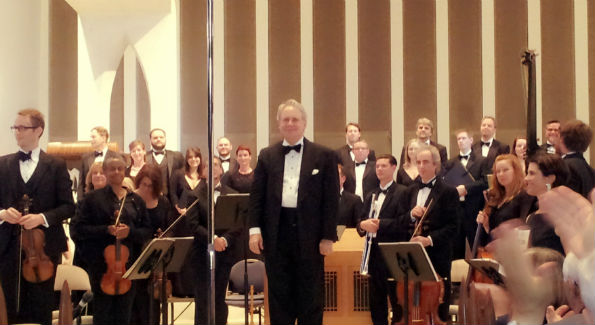The Washington Bach Consort showcased the Italian influence in Bach’s music in season opener.
By Patrick D. McCoy

The Washington Bach Consort, under the direction of J. Reilly Lewis, recently opened its 2013-14 season with an Italian flair.
(Photo by Patrick D. McCoy)
It certainly speaks volumes when a composer’s music can stand on its own after giving a gentle ‘nod’ to the music of other composers in the same program. The Washington Bach Consort concert at National Presbyterian Church did just that, as the concert featured the vocal and instrumental works of some of Bach’s musical colleagues from the Italian school such as Antonio Vivaldi, Tomaso Albinoni and perhaps the less familiar, Francesco Conti. Even though the pieces of the contrasting composers provided several points of interests, it was clear in the subtle interpolation of Bach’s pieces throughout that his music reigned supreme.
The afternoon began with the “Concerto for Trumpet, Oboe and Strings in D” (RV 563) by Vivaldi, featuring consort principals Josh Cohen and Geoffrey Burgess. Cohen’s trumpet coupled with the inner weaving lines of Burgess’ oboe were both masterful examples of the composer’s writing for the solo instruments, while at the same time accentuating the importance of the ensemble’s supportive strings. Organist Todd Fickley then performed J. S. Bach’s “Fugue in B Minor after Corelli” ( BWV 579). Offering the first Bach work on the program, Fickley played with skillful assurance, capturing the clean, distinct entrance of each voice of the fugal work. Light moments are one of things that attract many listeners to the concerts of The Washington Consort, and this concert did not disappoint as just before Fickley was about to play a brief organ malfunction occurred holding the audience at bay. But consort music director J. Reilly Lewis and the organist skillfully entertained the audience as the problem was resolved.
One of the lesser known composers of the concert, Francesco Conti, was represented by soprano Jennifer Ellis Kampani in the motet “Languet anima mea.” A welcomed contrast to the solely instrumental offerings, Kampani sang with a production that hinted at both old and new, with a mix of straight tones and liberal use of vibrato. The vigorous accompaniment married with the assured singing of Kampani seemed to hearken to the dexterity in the vocal works of Bach. The coloratura passages of the concluding ‘Amen’ showed the soprano in fine form.
Lewis showed his virtuosic prowess at the organ in Bach’s “Concerto in A Minor after Vivaldi” (BWV 593). This was a fine showcase for National Presbyterian Church’s great Skinner organ, as Lewis made fine use of the instrument’s antiphonal division in which the rear pipes answered those in the front of the church. Rounding out the first half of the program was a setting of the “Magnificat” by Giovanni Pergolesi.
The opening chorus was conducted by Lewis at a sprightly tempo, championed by both the singers and instrumentalists. In the brief duet, “Sucepit Israeil,” tenor Jason Rylander and baritone Mark Duer blended well together, setting the tone for the more expansive “Sicut locutus est” that followed by the choir and orchestra. The “Sicut erat” was a recapitulation of the same music heard in the opening “Magnificat” chorus and brought the work to its close.
Highlighting the second half of the program was the beloved “Gloria” by Antonio Vivaldi. Lewis conducted at a brisk tempo in the initial opening chorus, making the contrasting slower movements more poignantly noticeable. Sopranos Kampani and Robin Smith were certainly standouts in the “Laudamus te,” in which their voices negotiated the moving contours of the musical line, punctuated by uniformity in phrasing. Countertenor Chris Dudley provided an element of wonderment to the programs by the consort as he unassumingly took his place on the performance platform and then offered forth a sound of stunning beauty and vocal depth; it was particularly evident in his rendering of the aria “Qui sedes ad dexteram patris.”
The Washington Bach Consort gave an overview of other composers that Bach influenced and were influenced by him. Though the gems of this concert were not necessarily all his, this opening concert established that no matter where you put his music on a program, it is never in the ‘Bach” of one’s mind.
Recently named among the Forty Under 40 for his contributions to arts and humanities, Patrick D. McCoy received a B.M. in vocal performance from Virginia State University and a M.M. in church music from the Shenandoah Conservatory in Winchester, Va. He has contributed arts and culture pieces to CBS Washington, The Afro-American Newspaper and the newly published book, “In Spite of the Drawbacks” (Association of Black Women Historians), which includes his chapter on legendary soprano Leontyne Price. McCoy has interviewed some of the most acclaimed artists of our time, including Renée Fleming, Denyce Graves, Norman Scribner, Julian Wachner, Christine Brewer and Lawrence Brownlee. He serves as music director at Trinity Episcopal Church, DC. Listen to these interviews and others at Blog Talk Radio. McCoy may be reached via email at wlperformingarts@aol.com and on Twitter @PatrickDMcCoy.




